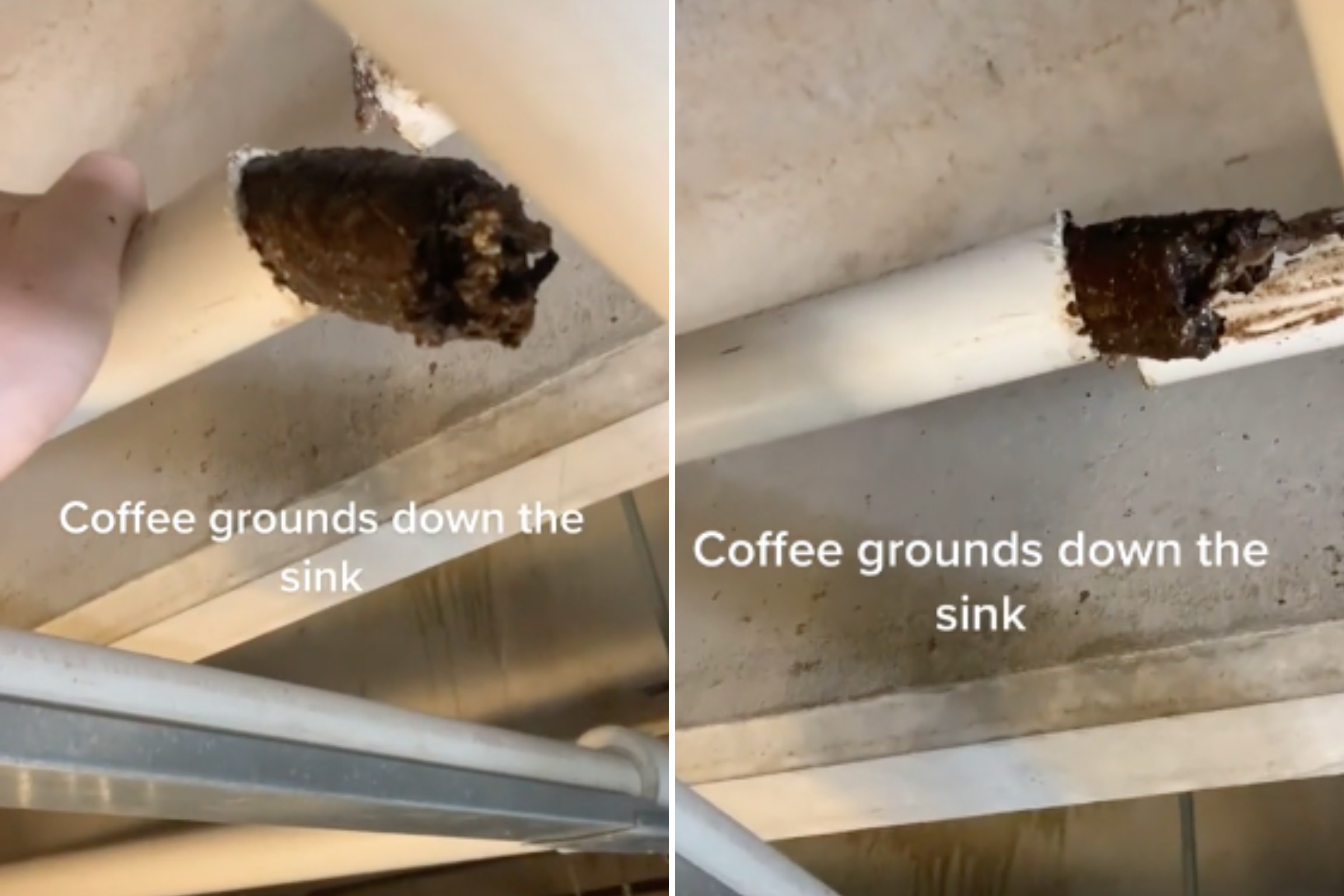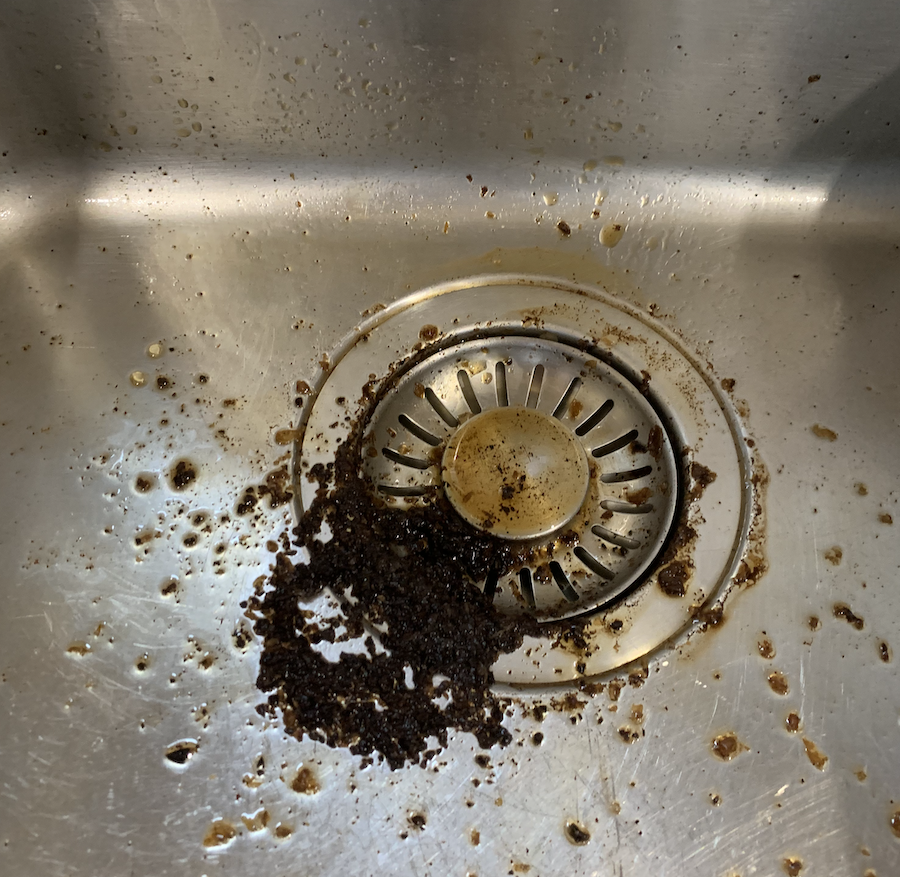Disclosure: This post contains affiliate links and I will be compensated if you make a purchase after clicking through my links. Learn More
No, coffee grounds should not go down the sink. They can cause clogs.
Coffee is a morning staple for many. But dealing with the leftover grounds can be tricky. Tossing them down the sink might seem convenient. Sadly, this can lead to plumbing issues. Coffee grounds don’t dissolve in water. They can build up in pipes.
Over time, this causes blockages. It’s important to find other ways to dispose of coffee grounds. This avoids costly repairs and keeps your plumbing running smoothly. So, what are the best methods for disposing of coffee grounds? Let’s explore safer and eco-friendly options.
Introduction To Coffee Grounds Disposal
Coffee grounds are a popular kitchen waste. Many people wonder about proper disposal methods. Pouring them down the sink seems convenient. But is it the best option? Understanding coffee grounds disposal is important. It helps in avoiding plumbing issues and environmental harm.
Why It’s A Common Practice
Many dispose of coffee grounds down the sink. It feels easy and quick. People rinse them away with water. This habit forms due to convenience. Cleaning up seems faster. But there’s more to consider.
Potential Risks Involved
Coffee grounds can clog pipes. They don’t dissolve in water. Over time, they build up. This leads to plumbing issues. Clogged drains require costly repairs. Coffee grounds can also harm the environment. They contribute to water pollution. Proper disposal prevents these risks.
Impact On Plumbing Systems
Have you ever wondered if you can pour coffee grounds down the sink? It might seem harmless, but it can have serious consequences for your plumbing system. Let’s dive into the specifics of how coffee grounds can affect your pipes.
Pipe Clogging Issues
Imagine you are washing away your morning coffee grounds. They might seem small and insignificant, but they can clump together in your pipes.
Over time, these clumps can grow larger. This can lead to significant blockages that hinder water flow.
Think about the hassle of a clogged sink. It’s an inconvenience you can easily avoid by disposing of coffee grounds in the trash or compost.
Long-term Plumbing Damage
Clogs are just the beginning. When coffee grounds accumulate in your pipes, they can cause long-term damage.
These blockages can lead to increased pressure in your plumbing system. This can eventually cause pipes to crack or burst.
Repairing or replacing damaged pipes can be costly and time-consuming. It’s much easier to prevent this damage by keeping coffee grounds out of your sink.
Have you ever had to deal with a stubborn clog or a burst pipe? It’s not just about the immediate fix; it’s about the long-term health of your plumbing system.
Next time you enjoy a cup of coffee, remember to think twice before washing those grounds down the sink. Your plumbing system will thank you!
Environmental Concerns
Coffee grounds might seem harmless when rinsed down the sink. Yet, their disposal can raise environmental concerns. These small particles can affect water systems and wildlife. Understanding these impacts helps us make better choices. Let’s explore the environmental issues connected to coffee grounds.
Water Pollution
Coffee grounds can contribute to water pollution. They do not dissolve in water. When they enter the water system, they can accumulate. This accumulation can clog pipes and lead to blockages. Over time, these blockages can cause sewage systems to overflow. Contaminated water may then enter natural water bodies.
Polluted water bodies harm aquatic life. Chemicals from coffee grounds can alter water quality. This change impacts the organisms living in these waters. Clean water is essential for both humans and wildlife. Therefore, reducing coffee grounds in drains can protect our water resources.
Impact On Wildlife
Wildlife can suffer from improper disposal of coffee grounds. Animals might ingest coffee grounds in water. Consuming these grounds can be harmful to their health. They can cause digestive issues or even toxicity in some species.
Moreover, coffee grounds can disrupt ecosystems. They alter the natural balance of nutrients in water. This change can affect food sources for aquatic animals. By avoiding coffee grounds in sinks, we help protect wildlife habitats. Every small action contributes to a healthier environment.
Alternative Disposal Methods
Disposing of coffee grounds down the sink can cause plumbing issues. They clump together and create blockages. Instead, explore alternative disposal methods. These methods are eco-friendly and beneficial. They help reduce waste and enrich your garden.
Composting Coffee Grounds
Coffee grounds are excellent for composting. They are rich in nitrogen, which plants love. Mix them with other compost materials. This creates a balanced compost pile. Coffee grounds break down easily. They add valuable nutrients to the soil. This improves soil structure and fertility. A healthy compost pile can thrive with regular coffee grounds.
Using Coffee Grounds In The Garden
Coffee grounds can enhance your garden’s health. Sprinkle them around your plants. This acts as a natural fertilizer. The nitrogen in coffee supports plant growth. Coffee grounds also deter pests. Slugs and snails avoid them. They improve drainage and aeration in the soil. Used coffee grounds can be a great mulch. They help retain moisture and regulate soil temperature. This simple addition can lead to a thriving garden.
Safe Sink Disposal Tips
Coffee grounds should not go down the sink. They can cause clogs and plumbing issues. Instead, use them as compost or garden fertilizer.
When you’re making your morning coffee, what happens to the leftover coffee grounds? If you’re like many people, you might be tempted to rinse them down the sink. But this can lead to clogs and plumbing headaches. Luckily, there are safe and simple methods to dispose of coffee grounds without causing issues in your plumbing. Let’s explore these practical tips to keep your sink in top shape.
###
Proper Usage Of Sink Strainers
Using a sink strainer can be your first line of defense against clogs. A strainer catches coffee grounds and other debris, preventing them from slipping down the drain.
Choose a strainer that fits snugly over your drain. This ensures it catches even the smallest particles.
Empty the strainer regularly to maintain its effectiveness. It’s a quick task that can save you from a costly plumbing bill.
###
Routine Maintenance Tips
Regular maintenance of your sink can prevent plumbing issues. Begin by flushing your drain with hot water after each use. This helps to dissolve any grease or oils that may trap coffee grounds.
Consider using a mixture of vinegar and baking soda weekly. Pour half a cup of baking soda followed by half a cup of vinegar down the drain. Let it sit for a few minutes, then flush with hot water. This natural method can help break down any buildup.
Finally, inspect your sink pipes occasionally. Look for signs of slow drainage or odors, which might indicate a clog. Early detection can save you a lot of trouble.
Have you ever had a plumbing disaster due to coffee grounds? What steps do you take to keep your sink clear? Engaging with these preventive measures can keep your kitchen running smoothly and stress-free.

Credit: www.newsweek.com
Diy Solutions For Clogged Sinks
Clogged sinks are a common problem in many households. Coffee grounds often contribute to these blockages. But don’t worry. There are DIY methods to tackle the issue. These methods are simple and effective. They can save you time and money.
Natural Drain Cleaners
Natural drain cleaners are a great first step. Baking soda is a popular choice. Pour half a cup down the sink. Then, add a cup of vinegar. The fizzing action helps break down clogs. Let it sit for 15 minutes. Finally, rinse with hot water. This method is safe and eco-friendly.
Lemon juice is another option. It works similarly to vinegar. Use it in the same way. Plus, it leaves a fresh scent. Salt can also help. Mix it with baking soda and vinegar. This combination is powerful against stubborn clogs. Repeat if necessary.
When To Call A Professional
Sometimes DIY methods aren’t enough. Persistent clogs may need expert help. If water drains slowly, consider calling a plumber. Strange noises can indicate bigger problems. Professionals have the right tools. They ensure your plumbing is in good condition.
Regular clogs might mean underlying issues. A plumber can diagnose these problems. They can prevent future blockages. If DIY solutions fail, don’t hesitate. A professional can save you from serious damage. It’s better to be safe than sorry.
Cost Implications Of Improper Disposal
Improper disposal of coffee grounds can lead to unexpected costs that disrupt your daily routine. Have you ever considered how those seemingly harmless coffee grounds can wreak havoc on your plumbing system? This section explores the financial burdens of careless disposal and offers practical solutions to avoid them.
Repair Costs
When coffee grounds go down the sink, they can accumulate and form clogs over time. These clogs block water flow, leading to slow drains or even complete blockages. Imagine waking up to a kitchen sink that won’t drain, forcing you to call a plumber. Repairing clogged pipes can cost anywhere from $100 to $500, depending on the severity.
Plumbing repairs aren’t just inconvenient; they drain your wallet. Unexpected expenses like these can disrupt your budget, leaving less room for activities you enjoy. Instead of splurging on a weekend getaway, you’re stuck paying for plumbing repairs.
Preventive Measures
Preventing clogs is simpler than you might think. Start by disposing of coffee grounds in the trash or compost bin. This small change can save you from dealing with costly plumbing issues later. If you’re a fan of composting, coffee grounds are excellent for enriching soil.
Consider installing a sink strainer to catch debris before it enters your plumbing system. These affordable devices act as a barrier, preventing coffee grounds and other waste from causing clogs. Investing a few dollars in a strainer now can save you hundreds in repair costs later.
Next time you’re cleaning up after your morning coffee, pause for a moment. Are you willing to take the risk of improper disposal? Embrace these preventive measures and protect your plumbing system from unnecessary damage.

Credit: cftproastingco.com.au
Frequently Asked Questions
Is It Okay To Wash Coffee Grounds Down The Drain?
No, it’s not okay to wash coffee grounds down the drain. They can cause blockages in pipes. Dispose of them in the trash or compost them instead. This prevents plumbing issues and is environmentally friendly. Regularly cleaning your drain also helps maintain a smooth flow.
What Is The Best Way To Dispose Of Coffee Grounds?
Compost coffee grounds to enrich soil and reduce waste. Use them as a natural fertilizer for plants. Avoid disposing of them down the sink to prevent clogging. You can also sprinkle them around plants to deter pests. For a sustainable option, check local composting programs.
Is It Okay To Throw Coffee Grounds Down The Garbage Disposal?
It’s not recommended to throw coffee grounds down the garbage disposal. They can cause clogs and damage the disposal.
Will Coffee Grounds Hurt The Septic System?
Coffee grounds can harm septic systems. They don’t break down easily and may cause blockages. Regular disposal of coffee grounds in the trash helps maintain septic health. Opt for composting to avoid plumbing issues and ensure your septic system functions efficiently.
Keep your system safe by avoiding coffee grounds disposal.
Final Words
Coffee grounds should not go down the sink. They can cause clogs. Over time, this can lead to plumbing issues. Instead, consider composting them. Coffee grounds enrich soil and benefit plants. You can also use them for cleaning. They scrub surfaces well.
This way, you avoid plumbing costs. Plus, you help the environment. Think before you toss grounds in the sink. Small changes make a big difference. Be mindful of waste disposal. Choose eco-friendly habits. Your pipes and the planet will thank you.


